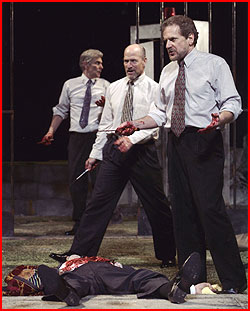
|
||
| Volume II, Issue II | Summer 2003 | |
| Summer 2003 Home Page |
| Culture, Politics & Technology |
| Fiction |
| Music |
| Poetry |
| Theater |
| About / Contact |
| Archive |
| Current Home Page |
'Caesar' still giving unto audiences
Review by Jim Trageser
|
SAN DIEGO
Two millennia after the man died, and another four centuries after Shakespeare immortalized him on stage, Julius Caesar still has lessons to teach.
The Old Globe's current production of "Julius Caesar" brings a touch of street theater to Shakespeare's grand political spectacle; with democracy struggling to take root in Afghanistan and Iraq (among others), it's interesting to see again the moment when democracy began to slip away from the Romans.
For Shakespeare's telling of the downfall of the mighty, triumphant Caesar at the hands of men he considered loyal is largely true to life: Caesar returned home to Rome after great conquests in Spain and France, ready to seize power as ultimate ruler over republican Rome – only to be assassinated by men who could not stomach the idea of sacrificing freedom to a popular tyrant.
For that was the great irony both of Caesar's time and Shakespeare's play: The Roman people were apparently ready to hand their right to vote off in exchange for the security of Caesar's rule.
This is the point of the review where a partisan crank would shift into a contemporary analogy, about how silly, stupid Americans are supposedly doing the same thing with their current president. Given the fact that our previous presidents of all stripes have done all sorts of callow things while in power yet still left office when their term was up, the analogy to any American president to date seems a reach, at best.
 Besides, there are larger lessons sprinkled throughout Shakespeare's work – such as the law of unforeseen consequences. The conspirators who kill Caesar believe they can control the political outcome – and instead see their nation thrown into civil war in the aftermath.
Besides, there are larger lessons sprinkled throughout Shakespeare's work – such as the law of unforeseen consequences. The conspirators who kill Caesar believe they can control the political outcome – and instead see their nation thrown into civil war in the aftermath.
You want contemporary lessons, apply that one to our foray into the Middle East.
The cast may be the strength of this production, and that's saying something given that the role of Caesar himself was woefully miscast. Whatever his faults, Caesar was no weakling in either will nor presence, neither in history nor Shakespeare's version – and yet, that's precisely how Robin Gammell presents him.
At the same time, Robert Foxworth's morally torn Brutus and Michael James Reed's cunningly vengeful Mark Antony are both such towering performances that they make up for the weak Caesar.
The set by Ralph Funicello is timelessly classic; it could have been in Caesar's own time or today.
The costumes, however, are a sorry lot. Mixing contemporary street fashion with business attire, Caesar and Co. are dragged into modern times. While director Daniel Sullivan keeps Shakespeare's dialogue intact, why have the modern dress and props? What is served by giving Caesar's security team assault rifles, or having a modern P.A. system incorporated into the public scenes?
As mentioned, the imaginative staging has its moments – when Mark Antony is given a chance to defend Caesar by the conspirators, the townspeople are sent up the aisles of the theater, where they turn and either heckle or cheer. It's a nice touch, and helps breathe yet more life into a play and story still very much relevant all these years later.
Jim Trageser is a writer and editor living in Escondido, Calif.
![]()
Summer 2003 Theater Section | Summer 2003 Main Page
Current Theater Section | Current Home Page
Copyright © Turbula.net